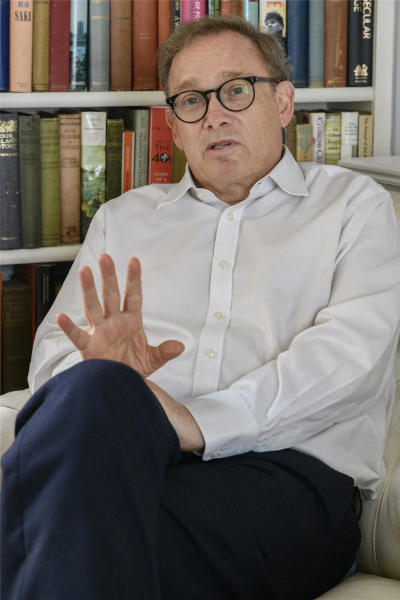 |
|
British author Adrian Wooldridge shares in his new book his observation of Western countries' weakness exposed by the pandemic. [Photo by Nick J.B. Moore/China Daily] |
Adrian Wooldridge believes the pandemic has revealed major weaknesses in the way the West is governed.
The 61-year-old political editor of The Economist, the British weekly magazine, says its failure to get to grips with the virus compared to the relative success of China and other East Asian countries in doing so has laid bare systemic failings.
"The West is growing complacent in terms of its government capacity and other chunks of the world are pulling ahead. This has been more and more vindicated by COVID-19," he says.
Wooldridge makes the argument in his new book, The Wake-up Call: Why the pandemic has exposed the weakness of the West-and how to fix it, written with John Micklethwait, himself a former editor of The Economist and now editor-in-chief of Bloomberg News.
The two former colleagues have a long-standing writing collaboration and the new book develops some of the themes in The Fourth Revolution: The Global Race to Reinvent the State, published in 2014.
"What we argued in that book was that the West was waking up to its problems, that it was beginning to take government more seriously, beginning, for example, to apply technological innovation to governance, and that it was on the right track. What COVID-19 has demonstrated is that we were very wrong about that," he says.
Wooldridge, who is speaking from his home in the South Downs of Hampshire in southern England, where he has spent much of his time this year due to the country's lockdown, is in a good position to assess the competence of Western governments since he has had a ringside seat in his 33 years at The Economist.
He has been its Los Angeles-based West Coast correspondent and its Washington correspondent before returning to the United Kingdom, where he now writes the Bagehot column on British politics, named after the periodical's famous 19th-century editor.
Apart from Micklethwait, he has also collaborated with former Federal Reserve Bank chairman Alan Greenspan in writing Capitalism in America: A History.
"Working for the Economist (where famously there are no bylines) I am quite used to a collaborative sort of enterprise," he says, laughing.
Wooldridge says the West now does need the wake-up call the title of the new book suggests. He insists the solutions it has come up with since the publication of The Fourth Revolution, the election of Donald Trump in the United States and Brexit in the UK, have been just "quackery".
"There's been an enormous amount of quackery. Populism feeds on very real worries about the fact that the elite is drifting away from the masses and that it applies one set of rules for itself and one set of rules for everybody else," he says.
"But it produces quack solutions, blaming everything on immigrants and the greediness of the elite rather than on structural problems within the system."
In their new book, in order to find solutions, the authors analyze why the West rose to ascendancy in the first place and has dominated the world order for the past 200 years or more.
"If you go back to the year 1500, China was the world's most impressive power, both in terms of its economic productivity and its administrative system. It had the world's biggest city in Beijing and the most advanced technologies in areas such as irrigation and shipbuilding," he says.
"Meanwhile the West at that time was a bloodstained backwater with constant wars between evil rival gangs."